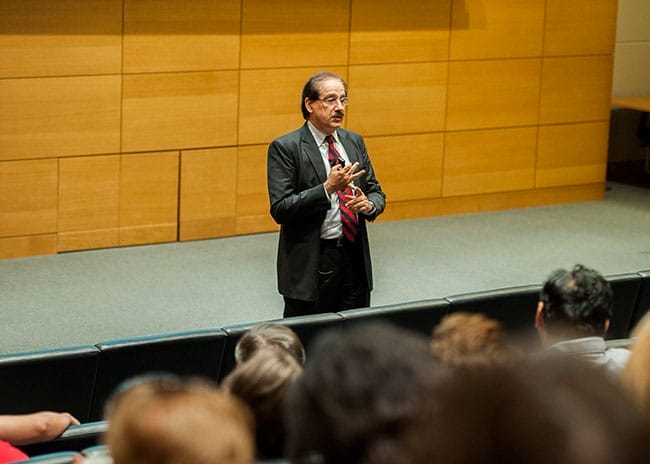The “Henry Ford generation of China” is now in charge at many private enterprises there, and Wharton researchers cannot hide their eagerness at learning from these unique business leaders. We first reported on the “The Tao of China” research project underway by Wharton faculty members Peter Cappelli, Harbir Singh and Michael Useem back in the Spring 2014 Wharton Magazine. They have since uncovered more.
The main takeaway is that Chinese companies cannot be stereotyped as low-cost producers. There is a very thoughtful approach taking place, whereby Chinese business leaders are imitating Western role models, then moving beyond them with a process-based innovation approach, explained Singh, Mack Professor of Management, Mack Institute co-director and vice dean of Global Initiatives. Jack Ma, founder of Alibaba, told the Wharton researchers how he purposefully learned from General Electric, Cisco and Google in an “explicit way.”Some of this learning is as explicit as shopping for the knowledge literally. Cappelli, Wharton’s George W. Taylor Professor of Management and director of the Center for Human Resources, told the story of one Chinese firm hiring U.S. business veterans—a CFO, COO and CMO—and bringing them to China to mentor their equivalents at the company. Their jobs weren’t to run the Chinese firm, but to teach the Chinese executives who were. Other Chinese companies have poured cash into hiring consultancies to learn how Western businesses work.
“They’re spending a ton of money on education,” Cappelli said.

Prof. Peter Cappelli. Photo credit: Phil Flynn.
Still, for all their efforts to learn how things get done in the West, Chinese business leaders are blazing their trails—differences that have resulted from the unique moment of growth in China and from the country’s business culture.
As for that growth, Chinese business leaders seek to “pursue scale at all costs.” They have a sense of urgency about them, which Singh reasons is from the fact that this Henry Ford generation lived through Mao’s Cultural Revolution and know firsthand that the “party will stop” eventually if the Communist Party decides it to be so. The Chinese business leaders, according to Useem, Wharton’s William and Jacalyn Egan Professor of Management and director of its Center for Leadership and Change Management, learned to lead through trial and error when they first began (pioneers like Lenovo starting in the ’80s), so they have been forced to develop their leadership talent internally.

Prof. Mike Useem
Culturally, organizations have been built around that internally developed leadership because there is a culture of trust in the country. On one level, Western-style loyalty to organizations is unheard of (though is it really heard of in the West anymore?); employees walk out of organizations for higher wages apparently with less regard for loyalty than do Western workers. Yet once loyalty has been established, Cappelli explained, it runs both ways. Dismissals and layoffs are rare. Transparency permeates at the top of the organizations and fewer internal controls (read: middle management) are then required to ensure performance and compliance.
Singh, Cappelli and Useem presented their findings during an exclusive Lifelong Learning session for alumni at Wharton MBA Reunion on May 15, 2015.
For all of the meteoric rise and continued promise of Chinese enterprises like Lenovo and Alibaba and their leaders, concerns remain. Singh cited three:
- What happens when growth slows down?
- How will they solve the conflict between investors seeking financial returns versus that growth at any cost?
- Wages and the overall costs of business are going up.
The story of Chinese business leaders is obviously nowhere near written yet, and neither is this Wharton research. Useem, Cappelli and Singh have so far interviewed 75 CEOs of private companies; the goal is 100.

























